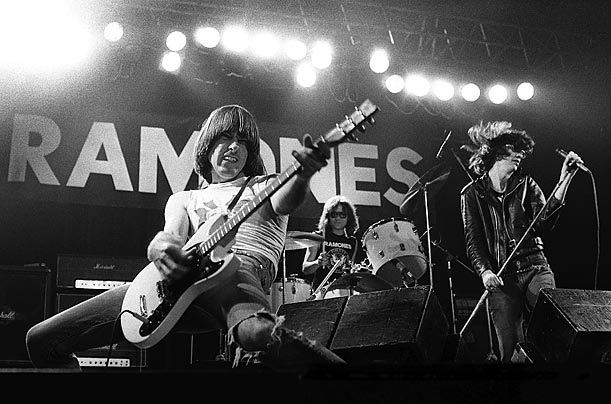“Each artist sounds the same. Everything sounds the same. It’s all fabricated. It’s moronic” -Johnny Ramone (Sullivan).
The simplicity and nostalgia of The Ramones’s brand of punk rock, heard on “Sheena Is a Punk Rocker,” deviates from two specific music genres of the two previous decades: prog rock and disco. Prog rock and disco both catered to more mature audiences, as artists playing the former trusted their audience to think through their music and the latter crafted music for dance club partying. By challenging these two more mature contemporary genres, The Ramones’s appeal to teenage audiences solidifies their appeal to younger Americans.
Punk vs. prog
Punk rock is typically seen as a response to prog rock, a line of rock music distinguished from other genres by qualities such as its long song lengths and spiritual song lyrics. Prog became popular in the 1960s and ‘70s, so this music would have been popular as the members of The Ramones came of age and began making music. The Ramones directly challenge prog with their DIY approach to music, as prog musicians were interested in exhibiting virtuosity on long, solo-heavy tracks. “Sheena Is a Punk Rocker,” two minutes and forty-eight seconds long, is tied with “Here Today, Gone Tomorrow” for the longest track on The Ramones’s Rocket to Russia. Their short tracks translated to live sets, with journalist Kris Needs claiming, “I’d heard they were pushing it if they were on for 20 minutes” (Needs). Punk shows focused on the energy and heat of the moment, while prog musicians created music with the album in mind, not live performance. The Ramones also wrote very simple, easy to remember lyrics for their songs. “Sheena Is a Punk Rocker” features only one verse, which is sung twice, then the chorus of “Sheena is a punk rocker,” which is repeated (along with slight variations) eight times after initially being sung. Prog’s lyrics were notable in that they focused on topics other than love and relationships, such as belief and metaphysics. While The Ramones were proud that they didn’t sing “stupid songs about sex” (Green), their minimalist lyricism starkly contrasts the high-minded lyrics to prog songs.
Punk vs. disco
Disco was especially popular in the United States when The Ramones were formed. Created for dancing settings and originally championed by minority and LGBTQ groups in American cities, disco had become widespread in popular music by the time “Sheena Is a Punk Rocker” was released. According to journalist Jim Sullivan of Sweet Potato (later of Hard Noise), “The Ramones famously hated disco” (Sullivan). When asked about the genre, Johnny Ramone told Jim Sullivan, “Each artist sounds the same. Everything sounds the same. It’s all fabricated. It’s moronic” (Sullivan). He added later that he believed disco was why The Ramones didn’t get any radio airplay (Sullivan). In “Sheena Is a Punk Rocker,” the band jabs at disco fans by setting their punk protagonist, Sheena, against the kids “going to the Discotheque Au Go Go.” This pits punk against disco by making the genres a one-or-the-other choice. The DIY sensibilities of The Ramones’s punk also challenges disco music, as there was less focus on production than would be seen on a disco track. While disco music usually sounds glossy and glitzy with strings, electric piano, and synthesizers, The Ramones’s music has a DIY, garage roughness and its guitars are fuzzy with distortion.
